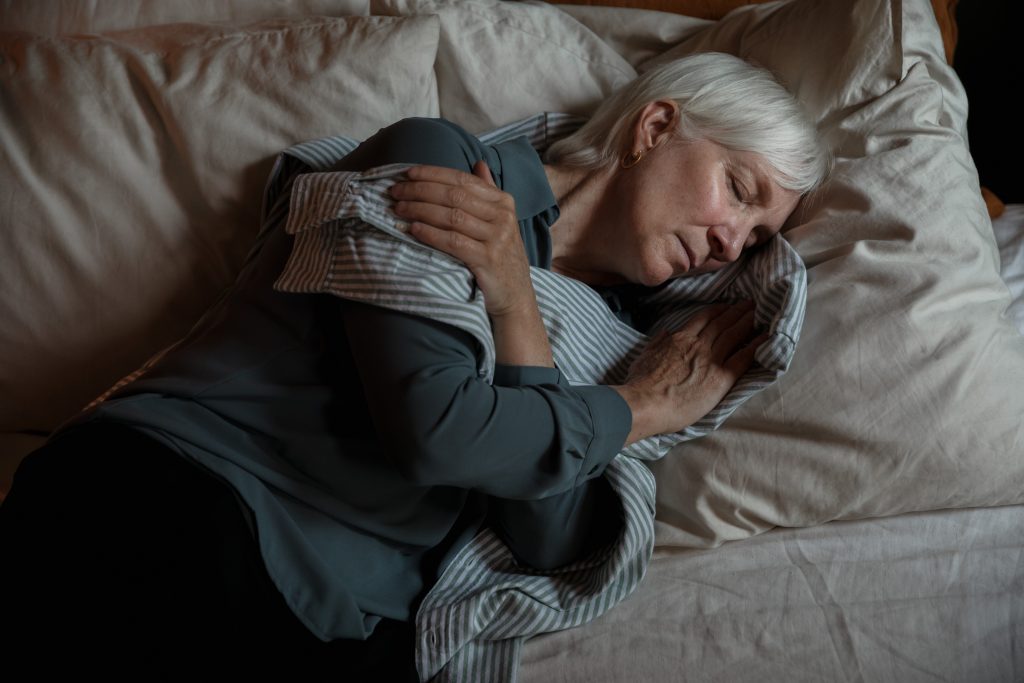
National Sleep Awareness Week is from March 13-March 19 in 2022, and during that week in Water Valley and elsewhere around the U.S., it will be a time for reminding people you know about the importance of good sleeping habits. Senior home care professionals have long understood the connection between a good night’s sleep and good performance the next day. After a good night’s sleep, it’s much more likely that a senior will wake up refreshed and better able to deal with whatever new experiences and old routines the coming day has to offer. If you ever doubted this, here are some ways that poor sleep quality may be affecting your elderly loved ones.
Causes negative feelings about aging
A recent study had as its premise an interest in finding out how sleep quality affected the outlook of participants. Nearly 5,000 people aged 50 and over were included in this study, to obtain as broad as possible a survey of their comments on sleep. All participants were asked to fill out a questionnaire with queries about negative changes to their energy, independence, motivation, activities, and memory. The same questionnaire was completed by study participants two different times, with those instances being a full year apart. After the study was completed and researchers had a chance to analyze all gathered data, it was clear that the people who gave the worst rating to their sleep quality felt that they were aging badly.
Physical impacts
There can be some legitimate effects on your health when you have poor sleep quality. During the sleep cycle, everyone goes through four different stages, rapid eye movement (REM) and non-rapid eye movement (NREM), which are distinguished as stages N1, N2, and N3. The different stages of sleep are vital for the restoration and recovery from illness, for consolidating and storing memories, carrying out bodily repairs, and regulating emotions. Also during the various stages of sleep, a number of different hormones are secreted and regulated. Growth hormone is issued during slow-wave sleep, or the N3 stage. This hormone has a huge responsibility of repairing blood vessels and is crucial because any tears in the blood vessels can cause plaque to build up. When plaque accumulates, the chances of a heart attack or a stroke are increased significantly.
Cognitive impacts
Scientists have discovered that poor sleep can make thinking much more difficult for everyone, especially elderly individuals. The scientific reason for this is that poor sleep tends to lower the connectivity between the prefrontal cortex of the brain and the amygdala. These areas of the brain are responsible for processing relevant information and controlling impulses. People who are deprived of sleep will have lapses in attention, make poor choices, have difficulty regulating negative impulses, and will more frequently engage in unethical behavior. Taken collectively, people who don’t get enough sleep are simply not as well equipped to process information.
Immediate effects of being sleep deprived
Whenever an elderly person sleeps much less than normal, a whole slew of immediate effects can be brought into play. Most people after a poor night of sleep will become much more anxious, irritable, and in some cases more depressed. Your mood can be interpreted as anxiety or depression after having had a poor night’s sleep. Then too, you’ll be much more likely to feel sleepy the next day, and it can actually cause you to fall asleep at various points throughout the day, for a few seconds or a few minutes.
This can be extremely dangerous if you are driving, and it can be inconvenient if you happen to be in a meeting. Anything that does not require being physically active might be a time where you doze off unexpectedly. Being sleep-deprived will also generally result in considerable fatigue the next day, with a lack of both mental and physical energy.
How aging changes sleep patterns
As a rule of thumb, it has been determined that sleep time will diminish by an average of 30 minutes each decade, beginning at mid-life. In addition to getting less sleep, the amount of time spent in REM sleep diminishes, and the whole architecture of your sleep pattern changes somewhat as you age. Your inner circadian rhythms will change, and this is important because the circadian rhythm affects almost all bodily processes. It’s regulated by distinct parts of the brain, by exposure to daylight, and by specific hormones. For many elderly individuals, circadian rhythm changes such that they become sleepy earlier in the day and wake up at an earlier time.
Many scientific experts believe the circadian rhythm weakens as you age so that there is not as clear a signal in organizing bodily processes. This causes a great many individuals to be out of sync with their rhythm, and to have a less fulfilling night of sleep. So it is normal for elderly people to sleep less deeply and for a shorter period of time, but it’s also true that some sleep problems can be related to a physical or mental health problem. That means you should never assume when your elderly loved one complains of poor sleep that it’s just a matter of getting old. Take care to check for the presence of any physical or mental issues which might be contributing to that poor night’s sleep.
